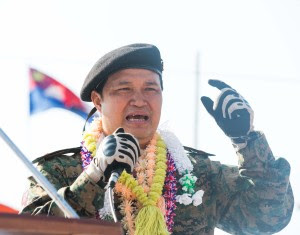General Ner Dah Mya, head of the Karen National Defence Organisation (KNDO) has called for Burma’s government to “show sincerity” and commit to a ‘sincere peace’ process.
 General Ner Dah has just presented a speech at a KNDO base in southern Karen State, honoring the efforts of the Karen in their 64-year-long struggle with Burma’s military regime. Walking over, he sits down on a wooden bench. “People are afraid to come back to Karen State.” He says, squinting from wind and a midday sun. “People are talking about a peace, and foreigners are saying, ‘Oh there is peace now in Burma, we can do business!’ But what about the refugees, what about the people who are still too frightened to return? There is no real peace in Burma at the moment.”
General Ner Dah has just presented a speech at a KNDO base in southern Karen State, honoring the efforts of the Karen in their 64-year-long struggle with Burma’s military regime. Walking over, he sits down on a wooden bench. “People are afraid to come back to Karen State.” He says, squinting from wind and a midday sun. “People are talking about a peace, and foreigners are saying, ‘Oh there is peace now in Burma, we can do business!’ But what about the refugees, what about the people who are still too frightened to return? There is no real peace in Burma at the moment.”
General Ner Dah, whose father, the legendary General Bo Mya, was once the long-standing chairman of the Karen National Union and a leader of the Karen National Liberation Army, questions the true intentions of Burma’s military, which he claims has strengthened it’s forces and bases in Karen State during the ceasefire talks.”We have estimated that there are around 300 military outposts in Karen administrated areas. So if they are talking about peace and then sending more supplies, more troops to the front lines, how can you believe them? They have tried to twist the whole story.”
Over the last two years, the Karen Human Rights Group (KHRG), an independent human rights group, has documented the Burma Army’s reinforcement in Karen State in spite of the ceasefire talks, including the transportation of heavy artillery, reinforcing troops and the transportation of iron and cement for permanent bases.
General Ner Dah said he did not reject peace, and saw negotiation as an answer to lasting stability, but urged caution. “We need to discuss our problems on the negotiating table. We don’t reject peace and at the same time will continue talking with them [Burma's government] but at the same time we have to be alert, have to be careful and always have to be prepared.”
General Ner Dah said that it was almost impossible dealing with a government still dominated by the very military apparatus that the KNU had been fighting against for over 65 years. “Right now we are negotiating with a military regime. It is not the answer. We need to have democracy in Burma. Dealing with the current military government is just a temporary issue. But for 60 million people we need to be free and under a democratic government and [we have to] have self-determination.”Political power in Burma is still heavily influenced by the military, which has a guaranteed 25% allocation of seats in parliament. The military also receives the largest individual share of government funding, with around 22% of the official budget, although UNICEF has estimated the true figure to be around 30%.
An Uncertain Future for Karen Armed Forces
General Ner Dah was unclear about the future role of Karen armed groups if a lasting peace was established with Burma’s government. However, he did say that Karen armed groups, such as the KNLA, would have to reform itself and “start from the beginning,” if a lasting peace was established with Burma’s government. But first the Karen needed to have their own autonomous state as part of a federal union with Burma and the other ethnic states, he said.”We can be a federation and work together with other states and have a central government but we need to have democratic governance in order to have a central government.”
General Ner Dah said that Burma’s government was currently dominated by the military and this was a stumbling block to lasting peace and democracy in Burma. “We cannot have a genuine federation while there is a military dictatorship at the heart of the central government.” Colonel Ner Dah said that he thought democracy would be the bedrock to peace in Burma. “There needs to be constitutional reform, and we need to have free and fair elections, without free and fair elections how can you have a democratic government? As Karen we are fighting for our rights, self-determination, an autonomous state, and democracy.”



